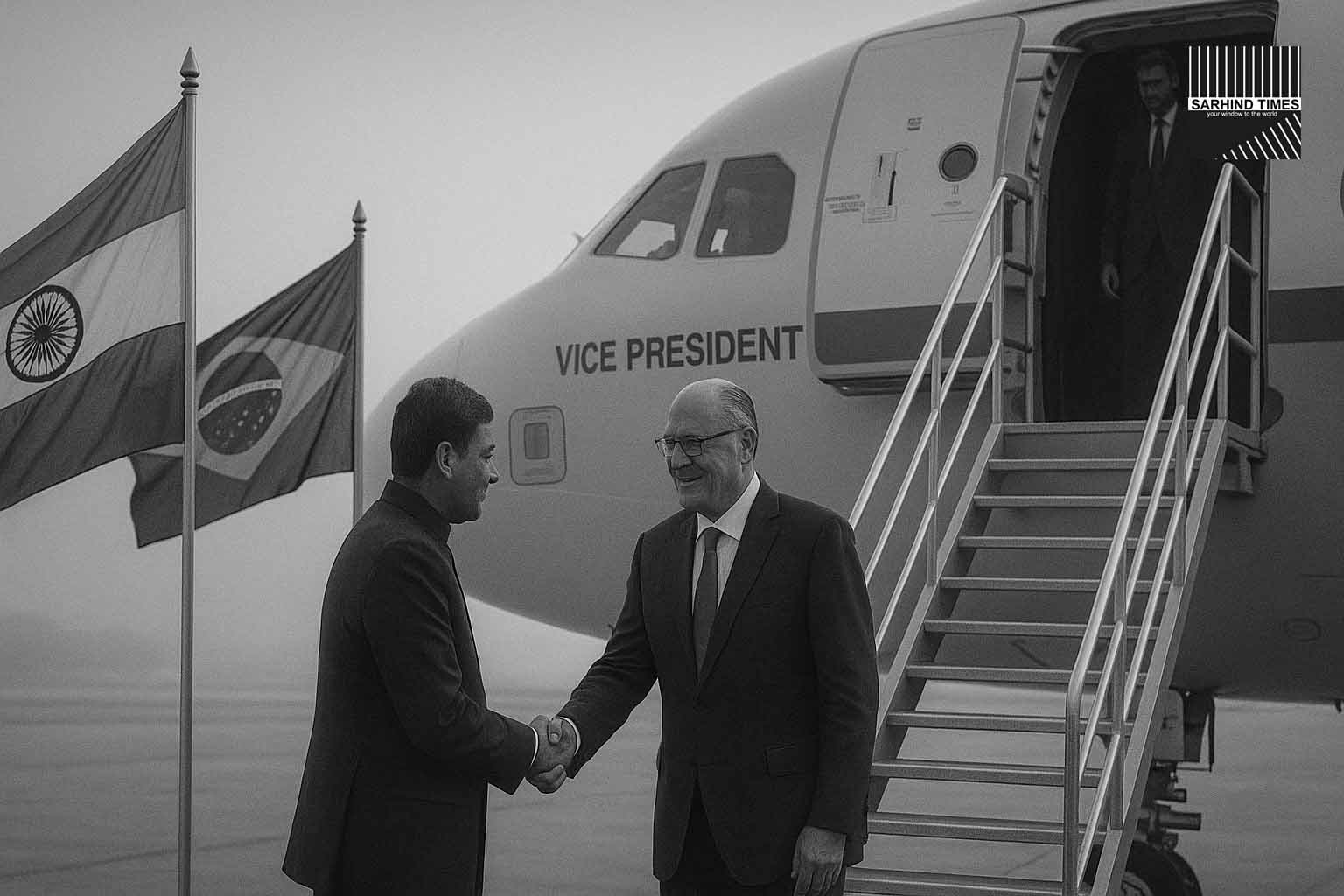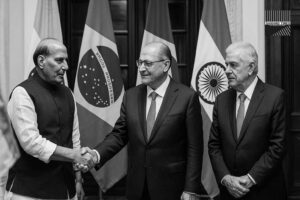By Sarhind Times Bureau | New Delhi | October 15, 2025
Introduction: A New Chapter in South–South Cooperation
In a significant diplomatic event marking the deepening of India–Brazil relations, Brazilian Vice President Geraldo Alckmin arrived in New Delhi on Tuesday, beginning a three-day official visit (October 15–17) aimed at boosting industrial collaboration, green partnerships, and trade expansion between the two emerging economies.
Accompanied by Maria Lucia Alckmin, who is scheduled to engage in cultural and social programs, the Vice President’s visit underscores a renewed political and economic commitment between the two BRICS nations to strengthen ties across manufacturing, services, and sustainable technology.
The Ministry of External Affairs (MEA) confirmed that discussions would focus on supply-chain resilience, co-development in clean mobility, agriculture technology, digital trade rules, and joint industrial standards — all key elements of a new, pragmatic era of India–Latin America cooperation.
Strategic Context: Why This Visit Matters Now
India and Brazil, both major democracies in the Global South, are experiencing similar developmental challenges—energy transition, digital infrastructure, and sustainable growth.
Diplomatic observers view the visit as a strategic inflection point, coinciding with India’s expanding engagement in Latin America beyond traditional oil and commodities trade.
“The India–Brazil partnership is not just about trade—it’s about creating a blueprint for South–South industrial cooperation in a world reconfiguring supply chains,” said Ambassador R. P. Singh, a former envoy to Brazil.
The timing of Alckmin’s visit—just ahead of G20 and BRICS+ industrial policy talks—signals India’s diplomatic intent to jointly shape global standards in manufacturing, green finance, and mobility.
Trade Snapshot: Room for Expansion
Bilateral trade between India and Brazil has already crossed $16 billion in FY2024–25, driven largely by crude oil, sugar, automobiles, and pharmaceuticals.
However, both sides acknowledge significant untapped potential in:
- Processed foods and agri-business technologies
- Pharmaceuticals and biotech manufacturing
- Renewable energy solutions and green hydrogen
- Mining technologies and rare earth collaboration
- Digital trade and IT-enabled services
Commerce ministry data shows that India is Brazil’s fourth-largest trading partner in Asia, while Brazil is India’s largest trade partner in Latin America.
Officials say the new round of discussions aims to broaden the trade basket and remove tariff and logistics bottlenecks, particularly through direct shipping and fintech-enabled trade settlements.
Day 1: Arrival and Bilateral Talks in Delhi
Upon arrival at Indira Gandhi International Airport, Vice President Alckmin was received by Minister of State for External Affairs Meenakashi Lekhi and senior officials from the MEA’s Latin America Division.
Later in the day, Alckmin visited Rashtrapati Bhavan, where he was accorded a ceremonial welcome and inspected a guard of honour.
Formal discussions began at Hyderabad House, where Alckmin met Vice President Jagdeep Dhankhar and Commerce Minister Piyush Goyal.
The talks focused on expanding industrial cooperation under “Make in India” and “Invest in Brazil” frameworks.
“Brazil is a key partner in our manufacturing and green energy growth story,” said Commerce Minister Piyush Goyal. “Our discussions today pave the way for deeper collaboration between Indian MSMEs and Brazilian technology firms.”
Both sides agreed to establish a Joint Working Group on Industrial Innovation and Skills, which will align certification standards and facilitate cross-country startup collaboration.
Focus Areas: Green Industry and Resilient Supply Chains
One of the visit’s central themes is the Green Industrial Transition.
Brazil, a leader in biofuels and ethanol technology, and India, an emerging hub in solar and EV manufacturing, are exploring joint ventures in bioenergy and green hydrogen.
Under discussion:
- Technology transfer agreements in bio-ethanol production.
- Joint R&D centres for green hydrogen and sustainable fuels.
- Cross-investments in electric vehicle (EV) battery supply chains.
- Carbon credit cooperation frameworks between India’s Carbon Market Platform and Brazil’s environmental exchange.
“We’re building not just economic value, but climate-conscious industry,” said a senior MEA official. “This visit will institutionalize sustainability as a pillar of our bilateral partnership.”
Maria Lucia Alckmin: Cultural Diplomacy in Motion
While the Vice President focuses on trade and industry, Maria Lucia Alckmin, the Second Lady of Brazil, is scheduled to participate in a series of cultural and women’s empowerment events in Delhi and Mumbai.
Her itinerary includes:
- Visiting National Museum and Crafts Museum to highlight Brazil–India artisanal ties.
- Attending an India–Brazil Women in Business Roundtable hosted by FICCI Ladies Organisation (FLO).
- Inaugurating the “Colours of Brazil” art exhibition, showcasing Brazilian contemporary artists inspired by Indian motifs.
These engagements underscore the soft power dimension of India–Brazil relations, enhancing people-to-people connect beyond the realm of politics and economics.
Industry and Business Roundtables
On Wednesday, Alckmin will attend the India–Brazil Business Forum organized by CII, FICCI, and ASSOCHAM, featuring CEOs from automotive, renewable energy, and fintech sectors.
Key announcements expected include:
- Launch of an India–Brazil SME Partnership Platform for supplier development.
- Signing of an MoU on digital trade facilitation and AI-driven customs processing.
- Discussion on port linkages through the Chennai–Santos maritime route.
“We are entering a new phase of economic diplomacy — one that connects factories, startups, and skills between our regions,” remarked CII President Sanjiv Bajaj.
The forum will also explore collaboration between Brazil’s SENAI (National Service for Industrial Training) and India’s NSDC (National Skill Development Corporation) to jointly design vocational training curricula for new-age industries.
Global Outlook: BRICS+, G20, and Beyond
Both India and Brazil play pivotal roles in shaping the BRICS+ and G20 agenda.
This visit is expected to strengthen alignment on issues such as re-shoring of supply chains, digital governance, and reform of multilateral development banks.
“At a time of shifting global alignments, the India–Brazil partnership stands for pragmatic pluralism — cooperation without confrontation,” said Dr. Sreeram Chaulia, Dean at Jindal School of International Affairs.
As Brazil prepares to host the G20 in 2025, the visit offers both countries an opportunity to synchronise priorities — from inclusive industrial policies to climate finance and fair digital trade rules.
Expected Outcomes: Toward a Strategic Economic Roadmap
A Joint Statement is expected at the conclusion of the visit outlining:
- Formation of three working groups on Industry, Digital Trade, and Sustainable Energy.
- Target to double bilateral trade to $30 billion by 2030.
- Collaboration on an India–Brazil Innovation Fund for joint R&D projects.
- Cultural and language exchange programmes under the “India–Brazil Connect 2030” initiative.
These frameworks will institutionalize cooperation and ensure that private sector participation complements governmental dialogue.
Diplomatic Voices: Optimism with Realism
While optimism runs high, experts caution that logistics bottlenecks and regulatory gaps must be addressed for tangible progress.
Ambassador Ana Lucia Freitas, a trade specialist at the Brazilian embassy, said:
“Our potential is immense, but success depends on execution — ensuring smooth customs, faster investment approvals, and consistent follow-up at ministerial levels.”
Both nations’ foreign ministries are expected to appoint Special Envoys for Economic Affairs to monitor deliverables post-visit.
Conclusion: Partners in Progress
As Vice President Geraldo Alckmin’s visit unfolds, the message is clear — India and Brazil are ready to elevate their partnership from diplomatic dialogue to action-oriented cooperation.
From clean energy and agri-tech to digital governance and cultural exchange, the relationship is being redefined for a multipolar, sustainable future.
With complementary strengths — India’s tech and human capital, Brazil’s resources and industrial expertise — the partnership holds the promise of reshaping the Global South’s narrative from dependency to dynamism.
For both nations, this visit is not just a diplomatic event — it’s a blueprint for shared prosperity and resilient collaboration.
#IndiaBrazil #Diplomacy #Trade #Manufacturing #GreenIndustry #MEA #GlobalSouth #BilateralRelations #BRICS #G20 #EconomicPartnership #SarhindTimes





+ There are no comments
Add yours